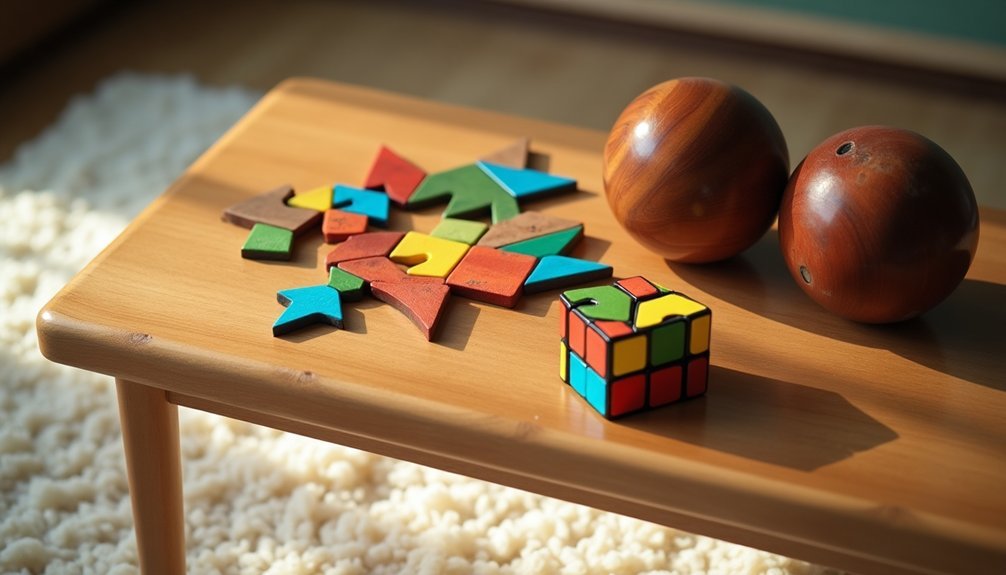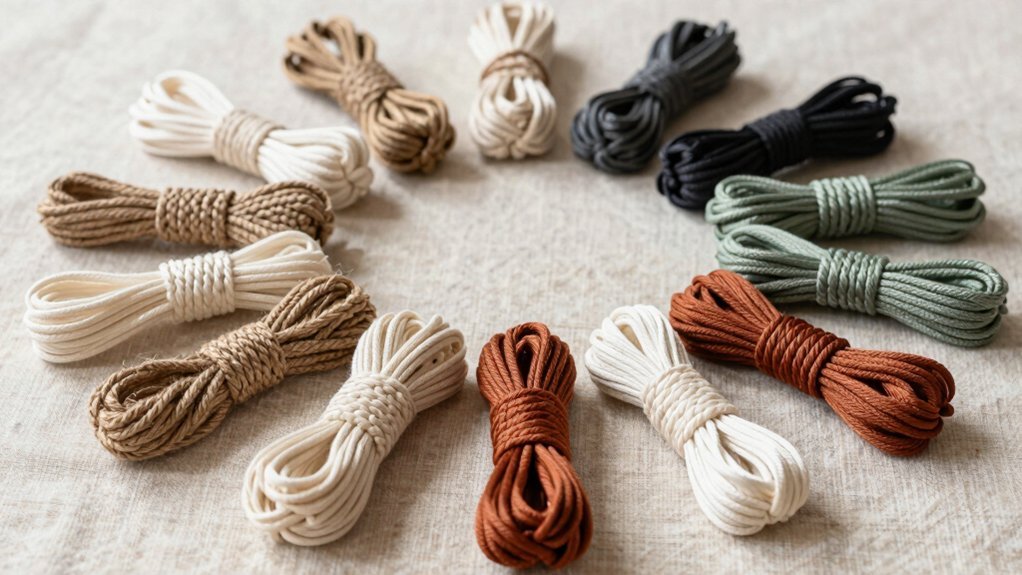If you're feeling overwhelmed by daily stress, you've probably tried various relaxation techniques. But have you considered memory games as a solution? Neurologists have identified seven specific games that can reduce anxiety while strengthening cognitive function. These aren't your typical brain teasers – they're scientifically backed tools that combine enjoyment with therapeutic benefits. From quick push-bubble games to emotional recognition cards, these options offer more than just momentary distraction.
Quick Push Bubble Game for Kids, Mini-Handheld Stress Relief Toy
For parents seeking screen-free entertainment that doubles as a cognitive development tool, the Quick Push Bubble Game offers a portable solution. With four game modes and durable silicone construction, you'll find it's perfect for waiting rooms or family game nights.
You don't need to worry about wear and tear – the ergonomic design and high-quality materials guarantee lasting durability. While you'll need three AAA batteries to power it up, you can adjust the volume to suit your environment. The game strengthens hand-eye coordination, memory, and reaction time, though you might face occasional sound quality issues. It's an engaging alternative to digital devices that brings families together through healthy competition.
Best For: Families and individuals seeking a screen-free, portable gaming option that combines entertainment with cognitive development, particularly suitable for children ages 5 and up.
Pros:
- Multiple game modes provide variety and sustained engagement for different skill levels
- Durable silicone construction ensures long-lasting use and comfortable handling
- Helps develop important skills like hand-eye coordination and reaction time
Cons:
- Requires AAA batteries which aren't included and need regular replacement
- Some users report issues with sound quality and volume control
- May experience operational problems after extended use
Hand2mind Express Your Feelings Memory Match Game for Kids
Parents and educators seeking an engaging way to build emotional intelligence will find the Hand2mind Express Your Feelings Memory Match Game invaluable. With 80 colorful tiles representing 20 distinct emotions, this game helps children develop memory skills while learning to recognize and express feelings.
You'll appreciate how this versatile tool works effectively in various settings, from home to therapy sessions. The game comes with a helpful Feelings Chart and Game Guide, making it easy to facilitate meaningful discussions about emotions. It's particularly beneficial for children with autism, helping them identify and understand different emotional expressions while reducing stress through structured play.
Best For: Parents, teachers, and therapists looking to help children ages 3-10 develop emotional intelligence and memory skills while engaging in interactive play.
Pros:
- Comprehensive set of 80 high-quality tiles covering 20 different emotions, providing extensive learning opportunities
- Includes helpful supplementary materials like Feelings Chart and Game Guide for structured learning
- Versatile educational tool that works well in multiple settings and particularly beneficial for children with autism
Cons:
- May be overwhelming for very young children due to the large number of emotions covered
- Requires adult supervision and guidance to maximize educational benefits
- Multiple copies of each emotion card might make the memory game too lengthy for some attention spans
eeBoo I Never Forget a Face Memory & Matching Game
Little hands will find joy and learning in the award-winning eeBoo I Never Forget a Face Memory & Matching Game, designed for ages 3 and up. With 24 pairs of durable 2.25-inch pressed cardboard tiles, you'll discover a thoughtfully crafted game that develops memory skills while celebrating diversity.
You'll appreciate how this Oppenheim Gold Best Toy Award winner stands out from mass-marketed alternatives. The high-quality artwork avoids stereotypes, sparking conversations about geography, culture, and religion. Whether you're playing solo or with others, the game adapts to different skill levels. It's an engaging choice that'll grow with your child, fostering patience, empathy, and recognition skills through years of regular play.
Best For: Families, educators, and caregivers seeking a high-quality educational memory game that teaches diversity while developing cognitive skills in children ages 3 and up.
Pros:
- Superior quality construction with durable pressed cardboard tiles that maintain their shape over time
- Educational value extending beyond memory skills to include cultural awareness and diversity appreciation
- Versatile gameplay options allowing both single and multiplayer modes, adaptable for different age groups
Cons:
- Higher price point compared to mass-market memory games
- Limited to 24 pairs, which may not provide enough challenge for older children or adults
- Cardboard material, while durable, may still show wear over extensive use
Mind Brain Emotion 52 Essential Coping Skills Cards for Stress Relief
Busy professionals seeking evidence-based stress relief will find valuable support in the Mind Brain Emotion 52 Essential Coping Skills Cards. Developed by a Harvard researcher and validated by psychologists, these poker-sized cards pack powerful CBT, meditation, and somatic exercises into a portable format.
You'll gain access to over 50 mindfulness activities targeting anxiety, anger, and burnout. The deck includes an Online Coping Assessment to track your progress and a free Online Learning Library for additional resources. Whether you're using them for individual reflection, group therapy, or daily affirmations, these cards offer structured strategies for building emotional resilience. They're particularly effective for veterans adjusting to civilian life and students developing social-emotional skills.
Best For: Busy professionals, students, and individuals seeking evidence-based stress management tools who prefer structured, portable coping strategies developed by mental health experts.
Pros:
- Comprehensive collection of 50+ evidence-based mindfulness activities developed by Harvard researcher
- Includes digital resources like Online Coping Assessment and Learning Library for progress tracking
- Portable, discreet format makes it easy to practice coping skills anywhere
Cons:
- Some users report concerns about card quality and durability
- May require consistent practice and engagement to see meaningful results
- Limited physical content (52 cards) without purchasing additional resources
Stages Learning Picture Memory Card Game
Memory enthusiasts seeking a versatile card game will find the Stages Learning Picture Memory Card Game an excellent choice for players of all ages. This 50-card set features 25 matched pairs of everyday objects with word labels, making it perfect for both toddlers and seniors.
You'll appreciate how this game serves multiple purposes – from helping children develop vocabulary and matching skills to keeping elderly minds sharp. The cards showcase vivid, real-life pictures that don't require reading ability, though they include words for sight-reading practice. While some users note outdated images and card quality concerns, the game's adaptability for 2-6 players and its stress-reducing benefits make it a worthwhile investment.
Best For: Young children, elderly players, and educational settings where a simple yet engaging memory game can aid in learning and cognitive development.
Pros:
- Versatile educational tool that helps develop vocabulary, matching skills, and memory
- Suitable for multiple age groups from toddlers to seniors
- Simple gameplay with real-life pictures that doesn't require reading ability
Cons:
- Some users report issues with card quality and thickness
- Contains outdated images of certain objects
- May be considered expensive for the quality provided
Assistex Matching Game Activity Board for Seniors with Dementia
Seniors with dementia and Alzheimer's will find comfort and cognitive stimulation in the Assistex Matching Game Activity Board, which features 37 vibrant cards across five themed boards. The high-resolution images of flowers, trees, ocean life, pets, and birds provide age-appropriate engagement without childish designs.
You'll appreciate the thoughtful design elements: thick, easy-grip cards and secure board dents prevent frustration during play. The included conversation prompts, fun facts, and activity book with 45+ ideas enhance social interaction and mental exercise. Users report improved concentration and mood, making this durable game a valuable tool for connecting with loved ones while providing gentle cognitive workouts.
Best For: Seniors with dementia or Alzheimer's who need engaging cognitive stimulation and their caregivers looking for meaningful activities to share together.
Pros:
- Age-appropriate design with high-quality, non-childish images across diverse themes
- User-friendly features including thick cards and secure board dents for easier handling
- Comprehensive activity support with conversation prompts and 45+ activity ideas included
Cons:
- Limited to 37 cards which may become repetitive with frequent use
- May be overwhelming for those in late-stage dementia
- Requires caregiver assistance and supervision for optimal engagement
Memory Matching Animal Cards for Toddlers (72 PCS)
Parents and teachers seeking a safe, educational game will find these 72-piece Memory Matching Animal Cards perfect for young learners ages 3-6. The double-sided, 2-inch cards feature real animals and blank spaces for drawing, making them versatile for multiple activities.
You'll appreciate the thickened cardboard construction with smooth, rounded edges that won't bend or fold. The non-toxic plant ink guarantees safety for little hands, while the engaging animal themes spanning land, marine, and farm creatures keep children focused and entertained. With a 4.7-star rating from 305 reviews, this compact game boosts memory, problem-solving skills, and social interaction while being travel-friendly and adaptable for various age groups.
Best For: Parents, teachers, and caregivers looking for an educational memory game to develop cognitive skills in children ages 3-6 while ensuring safety and engagement through real animal imagery.
Pros:
- High-quality, durable construction with child-safe materials including non-toxic ink and rounded edges
- Versatile double-sided design allows for drawing activities and traditional memory matching games
- Compact size makes it perfect for travel while offering educational benefits in memory and problem-solving
Cons:
- 2-inch card size may be smaller than some customers expect
- 72 cards might be overwhelming for younger players or those just starting
- Limited to animal themes, which may not appeal to children interested in other subjects
Factors to Consider When Choosing Stress-Reducing Memory Games
When you're selecting stress-reducing memory games, you'll want to match the design elements to your age group while ensuring the materials can withstand repeated use. You should evaluate the game's educational benefits and therapeutic potential, along with how easily you can transport it between locations. Consider starting with simpler versions that offer progression to more complex variations, allowing you to adjust the challenge level as your skills improve.
Age-Appropriate Design Elements
Choosing the right design elements for stress-reducing memory games requires careful consideration of the player's age and abilities. When you're selecting games for young children, look for bright colors and playful imagery that'll capture their attention. The game pieces should be larger and easier to handle, matching their developing motor skills.
For older adults, you'll want to focus on sophisticated designs with familiar objects and themes that resonate with their experiences. Consider games with thicker cards or pieces that are easier to grip. The complexity of gameplay should match the user's cognitive level – simpler rules for children and more strategic elements for adults. Remember that tactile features can make a significant difference, especially for seniors or those with dexterity challenges.
Physical Quality and Durability
Beyond the age-specific design elements, the physical construction of memory games plays a key role in their effectiveness as stress-reducing tools. When you're selecting a memory game, look for durable materials like thick cardboard or high-quality plastic that can withstand repeated use. The cards should feature rounded edges and smooth surfaces to guarantee comfortable handling, particularly if you or your loved ones have grip challenges.
Choose games with vibrant, high-resolution images that won't fade over time, and opt for cards with substantial weight and thickness to prevent bending during play. You'll want to verify that all materials are non-toxic, making the game safe for players of any age. These physical qualities guarantee that your stress-reducing memory game remains engaging and functional through countless therapeutic sessions.
Educational and Therapeutic Value
The educational and therapeutic benefits of memory games extend far beyond simple entertainment. You'll find these games enhance your cognitive functions while reducing stress and anxiety through engaging gameplay. When selecting a memory game, look for options that incorporate emotional recognition features, as they'll help you develop better social-emotional skills and empathy.
For children with autism, therapeutic memory games offer structured ways to identify and express emotions while building essential social skills. You'll want to choose games that include diverse themes and visuals, as they create opportunities for meaningful discussions about geography, culture, and emotional expressions. These elements combine to create a thorough learning experience that's both engaging and beneficial for your mental well-being, making memory games an effective tool for stress reduction and educational growth.
Size and Portability Features
While selecting stress-reducing memory games, portability and size considerations play an essential role in their practical value. You'll want to choose games with smaller cards or boards that are easier for children and seniors to handle, guaranteeing comfortable gameplay for everyone involved.
Look for compact and lightweight designs that you can easily transport to different settings, from doctor's waiting rooms to family gatherings. The game's packaging should provide convenient storage and organization, making it simple to pack for travel or playdates. You'll also benefit from selecting games with durable materials that can withstand frequent handling without deteriorating. Consider features that enhance accessibility, such as thicker cards or boards with easy-grip surfaces, which accommodate users with varying physical abilities and guarantee a more enjoyable gaming experience.
Complexity Level Options
Selecting appropriate complexity levels in stress-reducing memory games guarantees a balanced and engaging experience for all players. You'll want to match the game's difficulty to your target audience, ensuring it's challenging enough to maintain interest but not so complex that it creates frustration.
If you're choosing games for children, opt for simpler rules and fewer pairs to help them build confidence. For adults, you can select games with more pairs and advanced mechanics to enhance cognitive engagement. When playing with mixed-age groups, look for games offering adjustable difficulty settings or flexible rules that accommodate different skill levels.
Consider games that feature progressive difficulty levels, as they'll help you develop your memory skills gradually while maintaining a stress-reducing environment. This incremental approach provides a sense of achievement and keeps you motivated.
Frequently Asked Questions
How Long Should I Play Memory Games Daily for Optimal Stress Reduction?
You'll get the best stress-relief benefits by playing memory games for 15-20 minutes daily. Don't overdo it – short, focused sessions keep you engaged without adding pressure. Find your sweet spot within this timeframe.
Can Memory Games Help With Anxiety-Induced Insomnia?
Yes, memory games can help ease your anxiety-induced insomnia. They'll shift your focus away from anxious thoughts and calm your mind before bed, but it's best to play them at least an hour before sleeping.
At What Age Should Children Start Playing Stress-Reducing Memory Games?
You can introduce your child to simple memory games as early as age 3-4. They'll benefit most between ages 6-12, when their cognitive skills are rapidly developing and they're learning to manage daily stressors.
Do Digital Memory Games Provide the Same Stress Relief as Physical Ones?
While digital games can help reduce stress, you'll likely get more relaxation from physical memory games since they limit screen time and provide tangible engagement. Both formats can improve memory, but hands-on options offer better stress relief.
Can Memory Games Help Reduce Work-Related Stress During Office Breaks?
Yes, you'll find memory games can effectively reduce work stress during breaks. They'll help reset your mind, improve focus, and provide a healthy mental escape from office pressures when you've got 5-10 minutes free.
In Summary
You'll find these neurologist-recommended memory games offer more than just entertainment – they're powerful tools for reducing stress while sharpening your mind. Whether you're playing with colorful bubble games, emotion-matching cards, or traditional memory boards, you're actively engaging in scientifically proven stress relief. Choose the game that fits your needs and age group, and you'll soon experience the calming benefits of focused play.





Leave a Reply